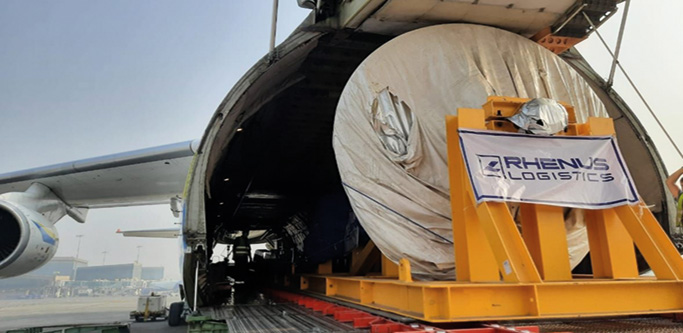Jun 23 | 2021
Urgent Outsized Heavy-Lift Transport Fulfilled by Air

 By Thomas Timlen
By Thomas TimlenGhana has made notable progress with respect to the diversification of its energy grid, motivated in part by climate change and the economic and environmental benefits seen in renewables. Globally, fossil fuel-powered plants still dominate, and this remains true for Ghana’s energy production, where hydropower comes in second.
One consequence of climate change that has impacted Ghana has been the resultant instability of its hydropower generation. To counter that, the government has looked towards other available renewable sources such as solar and wind to further diversify the mix. Of the two, the expansion of Ghana’s wind power production is showing impressive results and could put the country at the forefront of Africa’s wind energy producers.
The progress with wind power in Ghana has not been without challenges. Securing government approvals can be problematic. More than a half-dozen independent power producers, or IPPs, actively lobby to maintain their share of the market, most being oil and gas powerplant operators whose electricity comes at a comparatively higher cost for end users.
For the IPPs that utilize wind turbines to provide power to the grid, keeping their equipment online is critical. Any downtime results in revenue losses that persist until repairs are completed and the affected units are back in service. One such situation last year illustrated the related challenges, the underlying factors and the role of project cargo transportation providers, identifying a combination of entities with the know-how and equipment needed to implement timely solutions.
Need for Overseas Repairs
In July 2020 a rotor that required repair had to be moved from its location in Ghana to the manufacturer’s facilities in India. There were few options available to the IPP that owned the rotor with regard to where the repairs could be carried out. As Ritesh Nair, global sales director for projects at Rhenus Project Logistics, explained to Breakbulk: “This was proprietary material requiring specialized repair work, which had to be conducted by plants capable of handling the repair.”
Having no domestic Ghanaian repair facilities with the required capabilities that would also comply with the proprietary stipulations, the IPP approached The Heavy Lift Group, or THLG, seeking transportation solutions. The decision to approach THLG was no accident. The rotor owner did so, based on THLG member Rhenus Project Logistics’ past experience of having handled similar emergencies.
By July the rotor was ready for transport, with no shortage of challenges ahead. About 250 kilometers of road had to be traversed between its location and an airport capable of accommodating an AN-124-100 Ruslan aircraft. The rotor itself has a weight of 54 tonnes and dimensions of 10.5 meters long, 3.9 meters wide and 4.1 meters high. Rhenus Project Logistics engaged Bethel Logistics to handle the 250-kilometer road haulage to Accra, as well as the crane procurement and operations.
For the air transport, another challenge arose. Weight was not an issue, as the AN-124-100 can carry payloads up to 120 tonnes, with some modified models capable of carrying 150 tonnes. In this case, size was the challenge. “The rotor was initially on a frame that would not fit in the aircraft,” Nair said. “Rhenus Projects’ in-house engineering team, the Antonov Airlines engineering team, and the client worked together to rework the transport frame to make it fit the aircraft with a few inches to spare.”
Antonov Airlines’ Commercial Executive Vladyslav Ishchuk added: “The in-house engineering team of Antonov have a lot of experience, and since they thoroughly know Antonov aircrafts, they were able to help design exactly what was needed, taking into account all the features and having full access to operational data.”
Of course, transport by sea would have avoided all the weight and dimension issues, however, as minimizing the overall transport and repair time was prioritized in view of the IPP’s revenue loss during the rotor’s downtime, the slower transport by sea option was not attractive. The ocean transport option could have added about two months to the unit’s downtime, on top of the time required for the repair works.
Covid-19 Considerations
Once on board the AN-124-100, the rotor was on its way to India. Rhenus arranged for the crane operations and the road haulage from Mumbai airport to the repair facility. After the rotor’s arrival at that facility, delays with the repair work and consequences stemming from the Covid-19 pandemic arose, both posing new challenges that had to be overcome.
Nair noted that challenges such as customs clearance time in Ghana and India are to be expected, along with the necessary procedures to re-export rotors from India that were imported under a temporary bond. These were complicated, however, by the repairs taking longer than expected. “The challenges of repair work also meant that an extension had to be sought with Indian Customs to permit delayed re-export, in addition to export from another airport in a different Customs district,” Nair said. “Rhenus Logistics was actively involved with Customs, updating it on the status of shipment prior to arrival and prior to departure to ensure it was handled smoothly. Antonov Airlines also made last-minute adjustments to a busy flight schedule to ensure the flight was effected within the extended time, in the middle of the holidays.”
Why was the return flight suddenly required to depart from a different airport? Here is where the pandemic came into play. “Difficulties arose on the return flight from India to Ghana. The Ministry of Civil Aviation of India issued an Open Sky policy for non-scheduled cargo flights to and from India due to Covid-19,” Ishchuk explained. “The operations of foreign ad hoc and pure non-scheduled freighter charter service flights were restricted to six airports, namely Bengaluru, Chennai, Delhi, Kolkata, Hyderabad, and Mumbai. The flight was supposed to be operated from Ahmedabad, but due to this policy it operated out of Mumbai as closest to Ahmedabad, which is 500 kilometers away.” In turn, Rhenus had to make adjustments for this change of airport to get necessary permits to meet the flight in Mumbai.
Although the pandemic did impact this move, things could have been worse had the transport taken place in 2021. “The Covid-19 situation was better managed in India during the time of this project and hence we did not have the problems India is having presently,” Nair said. “However, availability of equipment and personnel was still a challenge both of which was expertly coordinated by Rhenus Logistics locally to ensure a smooth operation.”
Overcoming hurdles
Four months after its departure the rotor was back in Ghana in December 2020. Reflecting on the move, Nair summed up the significant challenges that were faced and how they were overcome.
“The shortest route could not be taken due to dimensions, but alternate routes were available. Permits and escorts needed to be arranged. The transport of the repaired rotor during holidays was more challenging than the transport itself, but it was overcome with detailed coordination and backup plans that were already prepared,” Nair said. As part of that effort, among other things, Antonov Airlines developed the required technical instructions.
The role of THLG in bringing together the entities with the necessary know-how paid off for the Ghanaian IPP.
“The THLG is staffed by members and works cohesively in the best interests of the members, their projects, and the group itself,” Nair said. “We come together to strategize and take best action forward on projects awarded to any member of the group, supporting such members with the best resources where it is needed. In this case, when we were approached, THLG members Rhenus and Antonov worked together to provide a viable solution to the client.”
The success of this endeavor was no accident, but rather reflects the longstanding professional collaborations between Rhenus and Antonov. Ishchuk concluded: “This transport operation required well-coordinated preparation and actions from both partners to fly such outsized and heavy cargo safely. Antonov Airlines showcased its flexibility by providing the AN-124 aircraft on the required dates during an extremely busy period for the customer to minimize any disruption that could have been faced.”
Nair added: “Rhenus Project Logistics USA and Antonov Airlines have an association going back over 15 years, which has involved multiple charter performances for mutual clients and is a testimony to the strength and expertise members of THLG bring to their clients.”
As wind turbines proliferate in all parts of the word, components will increasingly require urgent repairs, not all of which can be conducted on site. As such situations arise, the owners of this equipment will likely be turning to air transport as long as the aircraft can accommodate the increasingly large dimensions and weight of the units involved.
Thomas Timlen is a Singapore-based analyst, researcher, writer and spokesperson with 31 years of experience addressing the regulatory and operational issues that impact all sectors of the maritime industry.
Image credit: Antonov Airlines
